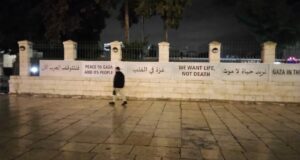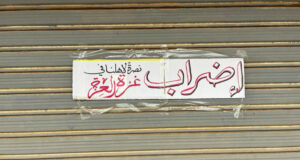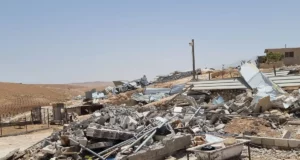The story of Shuhada Street is in essence a microcosm of the story of the “easing of restrictions” in the West Bank. It illustrates the gap between the smiling promises the prime minister makes to the head of the Palestinian Authority, and the reality on the ground. It demonstrates how complicated it is to get an Israeli army officer to change direction, and to teach his soldiers to treat the Palestinian population better.
Less than two weeks ago, it was published for the first time in these pages that the senior officers of the Israel Defense Forces Judea Brigade had discovered that the closure of Old Hebron’s Shuhada Street to Palestinians had been done “by mistake.” The mistake has now lasted for six years – without a proper closure order, relevant legislation or a court hearing. The attorney general promised activists of the Association for Civil Rights in Israel (ACRI) that the mistake would be corrected very soon. Captain Harel Weinberg from the attorney general’s office wrote to Limor Yehuda, a lawyer for ACRI, that “new directives are currently being issued that will allow movement at that location.” The snag, it immediately transpired, lay in the words “subject to security checks.”
Last Friday, activists from the Israeli organization Children of Abraham and from the International Solidarity Movement (ISM) accompanied a small group of Palestinians as they walked in the direction of the army outpost next to Hebron’s Beit Hadassah community. The soldiers on duty blocked their way. The group produced Weinberg’s letter, but the soldiers said that they had orders from their battalion commander not to let Palestinians use the street. After a 45-minute argument, the officer in charge ordered the barrier opened, and sent the group on its way – with an army and police escort.
Here is the essence of a report prepared by volunteers over three days: On Sunday morning, negotiations with the soldiers went on for almost two hours, in pouring rain. One of the ISM people was arrested on the grounds of failing to obey a soldier. At midday, the soldiers arrested Mary, a 75-year-old volunteer, after she tried to prevent one of the soldiers from kicking one of her colleagues. After an extensive “security check,” the group walked down the street, under a barrage of stones thrown at them by Jewish girls from the settler families; the policemen and soldiers did nothing to stop them.
The “carnival” ended at midday Tuesday. The soldiers informed Avichay Sharon (of Children of Abraham) that, as of that morning, use of the street is entirely prohibited. Sharon called Weinberg and explained the attitude of the local battalion commander to the letter regarding the mistake. According to Sharon, Weinberg responded that there had been disturbances at that spot in the last few days, and in such cases the brigade commander is authorized to declare the location a “closed military area.”
Sharon asserts that the talk about disturbances is baseless. He relates that since last Friday, he and his colleagues were constantly in the field, with the exception of the Sabbath, when no one tried to use the street. The only disturbance they witnessed was when the girls threw stones at the group. Nobody showed them an order relating to a closed military area.
The response from the IDF Spokesman’s Office was that the matter was being dealt with. Simple logic would dictate that for the gap between the declared easing of restrictions and reality to be actually narrowed, the prime minister and the defense minister need to inform the chief of staff and the GOC Central Command that a violation of a government decision is like refusing an order, perhaps even carrying a whiff of a military coup. The excuse of a “mistake”? Let them tell that to the judge.
Second shift
Prime Minister Ehud Olmert promised PA Chairman Mahmoud Abbas to streamline the movement of goods through the Karni border crossing, the main gateway to and from the Gaza Strip. And there is room for improvement. According to the Israel Airports Authority (IAA), which is also responsible for overland transit facilities, the terminal was closed for 104 days in 2006 – an average of two days a week. And on many days when it was open, its hours of operation were significantly shortened.
In November, for instance, a relatively very good month for 2006, the terminal was open for an average of 5.6 hours a day. (On a “full” day, with no security alerts or other disturbances, the terminal is open from 7:30 or 8 A.M. to 4.30 P.M.) Less than six hours is not enough to allow transit of the existing volume of goods and agricultural produce to and from the Strip. The Karni bottleneck causes severe damage to what is left of the local industrial and construction sectors, which suffer from a chronic shortage of raw materials.
Both the Israeli and the Palestinian sides agree that the best way to rectify the situation is for the terminal to operate an additional shift. It will cost money, of course, but according to Yoram Shapira, deputy director of the IAA, the sum is not so large. Once the fees the IAA collects from the merchants using the terminal have been factored in, it would cost the IAA from NIS 5-6 million a year to operate the terminal in the evenings. That amounts to about 10 percent of the PA’s losses due to closure of Karni during one-third of 2006 alone.
It seems that Olmert forgot to mention that important concession to his good friend, Finance Minister Avraham Hirchson. The IAA’s Shapira says that the Finance Ministry has yet to authorize the necessary additional budget. His people are prepared to work a second shift, and make their contribution to the policy of easing the Palestinian situation, but the IAA suffered enough financial losses in the year just ended: It has no intention of increasing the deficit in the new year.
An idea: Why not finance the second shift with the taxes of Gaza and West Bank Palestinians, which are being kept deep in the vaults of the Finance Ministry in Jerusalem?
 International Solidarity Movement Nonviolence. Justice. Freedom.
International Solidarity Movement Nonviolence. Justice. Freedom.


